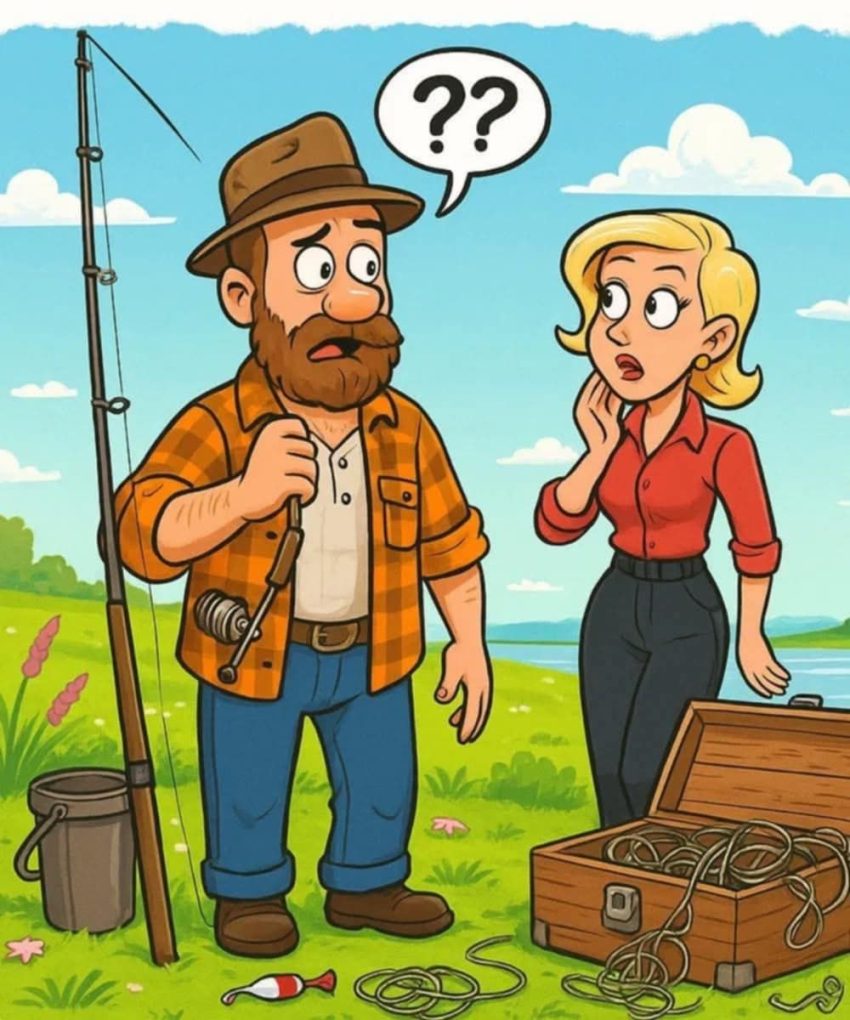One morning, a man phones his wife, and his voice sounds both excited and urgent. He says, “Honey, my boss has asked me to go on a week-long fishing trip with him out of town.” It may be a great break for me, and it might even get me a promotion. Could you kindly bring enough clothes for the week? Oh, and don’t forget to have my fishing rod and tackle box ready. One last thing: pack my new blue silk pajamas.
The wife stops for a moment. His tone or the fact that the trip came up so suddenly makes her head race. But she doesn’t say anything. Instead, she nods, says something kind, and gets to work. She packs everything he asked for: clothes, socks, gear, and toiletries. And, of course, the blue silk nightgown. But instead of putting them in his bag, she puts them in the tackle box.
A week goes by. He comes home looking a little tired but happy with himself, telling stories of outdoor experiences and getting along with his boss. She hugs him at the door, then soon starts to ask questions.
She asks, “How was the trip?”
“Great,” he says. “We fished every day and caught a lot of salmon, some bluegill, and even a few swordfish.”
She says, “Wow,” with a smile. “Sounds like a lot of fun.”

He stops, squints his eyes a little, and adds, “Hey… by the way…” I noticed that you forgot something. Why didn’t you pack my blue silk PJs?
She smirks, looking cool and collected. “Oh, I did,” she says. “They were in your fishing box.”
His face said it all. For a split second, his mind went back over the whole journey every time he opened that tackle box. Any time his employer or coworkers might have been able to see him. And her smile got bigger as she walked away.
A simple deed, rich in nuance, conveyed a clear message—one that was as neatly packaged as those pajamas.
That following week, at a party in the neighborhood, a lawyer and a doctor stood by the buffet with plates in hand, trying to relax. But the doctor couldn’t talk for more than five minutes without someone interrupting him.
“Please look at this rash for a second.”
“My shoulder has been hurting a lot.”
“Do you think this mole is suspicious?”
The doctor was charming and pleasant at first, giving advice and comfort, but after an hour of unplanned consultations, he was done. He sighed and looked at the lawyer next to him.
“Does this happen to you too?” he inquired. “Do people always ask for free legal advice at parties?”
The lawyer smiled slyly as he sipped his drink. “Of course,” he responded. “But I’ve figured out how to deal with it.”
The doctor asked, “Oh?”
“I give them the advice,” the lawyer continued, pausing for drama, “and then I send them a bill.”
The doctor blinked. “You’re joking.”
“Not at all.”
The doctor was amused and maybe even a bit inspired, so he decided to try it himself. The next morning, he sat down at his desk and typed up official, businesslike bills for all the free medical advice he had given at the party. They printed them off, signed them, sealed them, and then they went to the mailbox with a little bit of mischief in their hearts.
But before he could open the box, he saw that there was already an envelope inside with his name on it from the lawyer.
He opened it.
There was a bill inside, nicely folded.
To get legal help.
The two stories, which are both funny and have a hint of revenge, remind us that sometimes the greatest way to teach someone a lesson is not to confront them but to give them a quiet, smart twist. There’s always space for humor and just the right amount of revenge, whether it’s a sketchy fishing excursion or the never-ending free consultations that professionals have to deal with.
